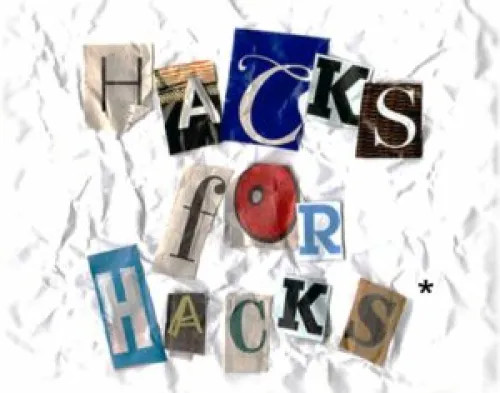January 24, 2023
Time to Make Your Old Year’s Writing Resolutions
by Bill Ferris
 Previously posted on WriterUnboxed December 8, 2021
Previously posted on WriterUnboxed December 8, 2021
Warning: Hacks for Hacks tips may have harmful side effects on your writing career, and should not be used by minors, adults, writers, poets, scribes, scriveners, journalists, or anybody.
This holiday season, give yourself the gift of lowered expectations by making some Old Year’s resolutions.
What are Old Year’s resolutions? Let’s start by talking about what they’re not. I’m not suggesting you scramble to finish the New Year’s resolutions before December ends, nor am I asking that you go back in time to cross them off your list.
Instead, all you have to do is resolve to do things you’ve already done. For instance, I resolved to finish this very column before the end of the year, and here I am keeping that resolution. A champagne toast to me!
What if I’ve already told people about my resolutions?
Many writers make the rookie mistake of sharing their resolutions with others in the name of transparency and accountability (commendable but foolish), or perhaps to try and impress someone at a NYE party by talking about finishing your book in an effort to get their phone number (totally worth it). Whatever the reason, you most likely have several personal enemies and professional rivals who would cackle with glee to see you fail in public, and Old Year’s resolutions help you find some plausible conditions to declare victory.
First, find your old list of New Year’s resolutions. You may have written them on a napkin, typed them into a neat list and posted it above your computer monitor so you could see it every day, or worst of all, posted it on your social media in the hope that you could shame yourself into productivity. Well, good news, nobody’s reading your blog anyway, so they won’t notice if you tweak your resolutions just a bit.
Instead, you take your New Year’s Resolutions that you made at the beginning of the year and amend them slightly, like how the Bill of Rights modified the U.S. Constitution. And these Old Year’s Resolutions could end up being just as—if not more!—important. Let’s look at some examples:
“I resolve to attend a writers conference!”: This is tough in the age of COVID, so you should make your Old Year’s resolution be “I resolve to confer with writers,” which can be easily done at your local bar, and you’ve barely changed the words. You can use your little conference as an excuse to toast your successful resolution!
“I resolve to publish at least one short story!”: With how slow the publishing industry moves, it’s unrealistic to think you can write, submit, get an acceptance letter, and see your story in print all in one year, right? If you submit a story to a market in 2021, but they don’t publish until 2022, that’s hardly your fault, is it? It’s like in basketball, where as long as you shoot before the buzzer, it still counts if it goes in. That’s why you should simultaneously submit every story you have to several dozen markets by the end of the year. One of them is bound to publish your story. Or they’ll publish a notice about how you shouldn’t spam their submissions like that, which you should definitely count as a publication.
“I resolve to finish my novel!”: This is the big one. For this resolution, it’s all about how you define “finish.” Take the NaNoWriMo approach and declare victory after you hit an arbitrary word count. “I resolve to write 50,000 words!” you might say. That’s basically the same thing! I myself am revising a novel with 80,000 words in it. No one in a position to publish this book would call it done, per se, but 80,000 is a novel’s worth of writing, right? I’ve got all the words in there, pretty much, they’re just not in the right order yet. (Hot tip: agents and editors love when you use this trick.)
So you see, by lowering the bar to the point where you can easily step over it, you’ll the old year on a high note, and set yourself up for success in 2022. And if you don’t succeed next year, just redefine success until you get there.

After college, Bill Ferris (he/him) left Nebraska for Florida to become a rich and famous rock star. Failing that, he picked up the pen to become a rich and famous novelist. He now lives in Chapel Hill, North Carolina, and looks forward to a life of poverty and ridicule.
Affiliates/Partners
Testimonials
Contact
Join CWA
Member Directory
My Account
Writers Conference
Presenters
Agents and Publishers
Pitch Sessions
Sponsors
Scholarships
Speaker Registration
Book of the Year
Spirit Award
First Chapter Contest
Resources
Home
Chicago Writers Association
info@chicagowrites.org
Make a Difference!

